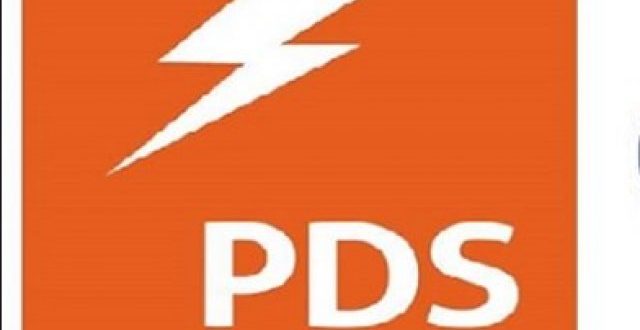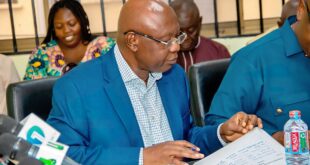FTI Consulting, a United States-based consulting firm commissioned by the Millennium Development Authority (MiDA) to investigate whether or not Power Distribution Services (PDS) Ltd duly won the contract to manage the assets of the Electricity Company of Ghana (ECG), has confirmed that insurance guarantees were, indeed, paid to back the PDS’s takeover of the assets and operations of the ECG.
A 32-page report submitted by FTI Consulting to MiDA, dated September 3, 2019 and signed by Pat Pericak and David Okhumal, both officials of the consulting firm, said: “We have not seen any documents that would suggest that, as of March 1, 2019, PDS, Cal Bank, Donewell and/or personnel from MiDA should have questioned the validity of the payment securities.”
“We further note that officials from Al Koot confirmed to K&L Gates, a law firm in Qatar, that the stamp applied on the Acknowledgement and Agreement page of the Payment Securities is that of Al Koot. They further confirmed that the signatures are those of Al Nouri and Fadi Danghouth, who are employees of Al Koot,” the report disclosed in response to claims by Al Koot that the staff who signed the insurance guarantee did not have the authority to do so.
However, the report also found out that “of the $12.25 million that was charged by Cal Bank to PDS as fees for raising the Payment Securities, only $1 million (8%) was funded by an equity contribution by a PDS shareholder; $7 million (57%) was funded by a loan that was advanced by Cal Bank to another PDS shareholder. This loan was repaid from operating cashflows generated by PDS after the transfer date”.
“The balance of $4.25 million (35%) was also paid directly from operating cashflows generated by PDS after the transfer date,” it said.
Reviews
It said based on reviews of background documents, interviews conducted and independent investigative analysis performed to date, the Payment Securities that were presented by Cal Bank and PDS to MiDA on February 27, 2019, which were subsequently accepted by the Ministry of Finance and the ECG, were compliant with the recommendations contained in the Universal Rules for Demand Guarantees (URDG 758).
Report rejected
However, sources familiar with the investigations have told the Daily Graphic that the government and the board of MiDA have rejected the FTI report.
That, the sources said, was because investigations conducted by the American and the Ghanaian sides of the power compact had come to the conclusion that there was no valid guarantee.
Both sides are currently engaged in discussions for possible remedies.
FTI report
On whether or not the official of Al Koot who signed the insurance guarantee had authority to do so, the FTI report said: “Based on our review of Section 8 of Al Koot’s Delegation of Authority, which was produced by Al Koot to the government of Ghana, Al Nouri does not have the authority to bind Al Koot in relation to the Demand Guarantee without the board’s approval, which we have not seen as part of the executed PDS transaction documents.”
It further provided that despite the fact that the unfolding events from the corridors of Al Koot might provide a basis to proceed in a lawsuit against Al Koot, there was the need to do a separate and further analysis to make that determination.
Demand Guarantees
The report also noted that PDS could not secure the demand guarantees or Letters of Credit, as per the requirements of the Lease and Assignment Agreement (LAA) and the Bulk Supply Agreement (BSA) from a bank because of three “main” challenges, namely: “PURC’s delay in approving the Rate Setting Guidelines and the initial rates that PDS was authorised to charge; the delay in agreeing on the list of power purchase agreements (PPAs) made, and PDS not having a certain level of capital required for the issuance of a cash backed payment.”
Can Al Koot reinsure?
FTI Consulting noted in its report that it was unable to independently obtain Al Koot’s insurance licence.
It said officials from Al Koot refused to produce it upon request, adding that “as such, we do not know contents of the licence and are unable to determine if, as a general matter, Al Koot is permitted by its licence to reinsure a portion of the risks assumed by a primary insurer under a demand guarantee governed by the Uniform Rules for Demand Guarantee”.
“It appears that personnel from Al Koot’s reinsurance department previously engaged in transactions that are similar to the PDS guarantees. These transactions, which leveraged the strength of Al Koot’s credit rating, were brokered by JoAustralia and reinsured by Al Koot, with further instructions by Al Koot to JoAustralia to retrocede (insurance premium paid on a reinsured business) them to other reinsurers.
“Based on an arrangement with JoAustralia, a 10 per cent fee was credited back to Al Koot in these types of transactions,” the report stated.
In the case of PDS Guarantees, FTI confirmed that 15 per cent was retroceded to a local Ghanaian insurance company.
“Thus, it appears that Al Koot acted in the manner that would be expected if the demand guarantees that were issued were valid,” the report noted.
Guarantee funds
FTI found out that of the $350 million Demand Guarantee that was executed by Donewell, 95 per cent was reinsured by Al Koot and signed for by Al Nouri and Fadi Danghouth.
The report said Cal Bank charged a fee of 3.50 per cent for advising on the issuance of the Demand Guarantee, translating into $12.25 million for the bank.
Out of Cal Bank’s fee of $12.25 million, $7 million was paid to Donewell as insurance premium and retained $5.25 million.
“We confirmed with the
relevant government agencies that Donewell paid the required withholding tax of five per cent ($350,000) and the National Insurance Commission (NIC) levy of 1.5 per cent ($105,000).
“The total insurance premium of $7 million was posted to Donewell’s Cal Bank account on February 27, 2019. As reported by Donewell, a portion of this amount was distributed to four local Ghanaian reinsurers and JoAustralia (the reinsurance broker),” the report said.
Background
A statement issued by the Minister of Information, Mr Kojo Oppong Nkrumah, on Tuesday, July 30, 2019, announced the suspension of the concession agreement and explained that the decision followed the “detection of fundamental and material breaches of PDS’s obligation in the provision of Payment Securities (Demand Guarantees) for the transaction which were discovered upon further due diligence”.
“The demand guarantees were key prerequisites for the lease of assets on March 1, 2019 to secure the assets that were transferred to the concessionaire,” it said.
Compact
Mr Nkrumah told journalists on August 1, 2019 that the government was taking steps to secure the second tranche of $190 million compact from the American government following the suspension of PDS operations.
Subsequently, a team had been tasked to continue engagement with the American government through its agency, the Millennium Challenge Corporation (MCC), the statement said.
“This engagement is about the possible next steps after the inquiry and channels for sharing information as part of this inquiry,” he said.
According to him, the team was expected to visit the United States of America (USA) as part of its engagements.
 Home Of Ghana News Ghana News, Entertainment And More
Home Of Ghana News Ghana News, Entertainment And More





